ACCG 848 - Ethical Analysis: Should Business Adopt Gender Quotas?
VerifiedAdded on 2023/06/11
|9
|2586
|175
Essay
AI Summary
This essay critically examines the ethical dimensions of implementing gender diversity quotas in businesses. It begins by introducing the debate surrounding gender diversity and its potential impacts on corporate boards, referencing arguments for and against such quotas. The essay then delves into two prominent ethical theories: Deontological ethics and Utilitarianism, analyzing their positive and negative consequences in the context of gender diversity. The deontological perspective focuses on moral obligations and duties, while the utilitarian approach emphasizes maximizing overall well-being. The essay explores how these theories inform the discussion on whether businesses should be compelled to adopt gender diversity quotas, considering factors such as representation, ethical decision-making, and potential drawbacks like tokenism and conflicts in moral duties. Ultimately, the essay synthesizes these theoretical analyses to provide a nuanced perspective on the complexities of gender diversity quotas in the business world.
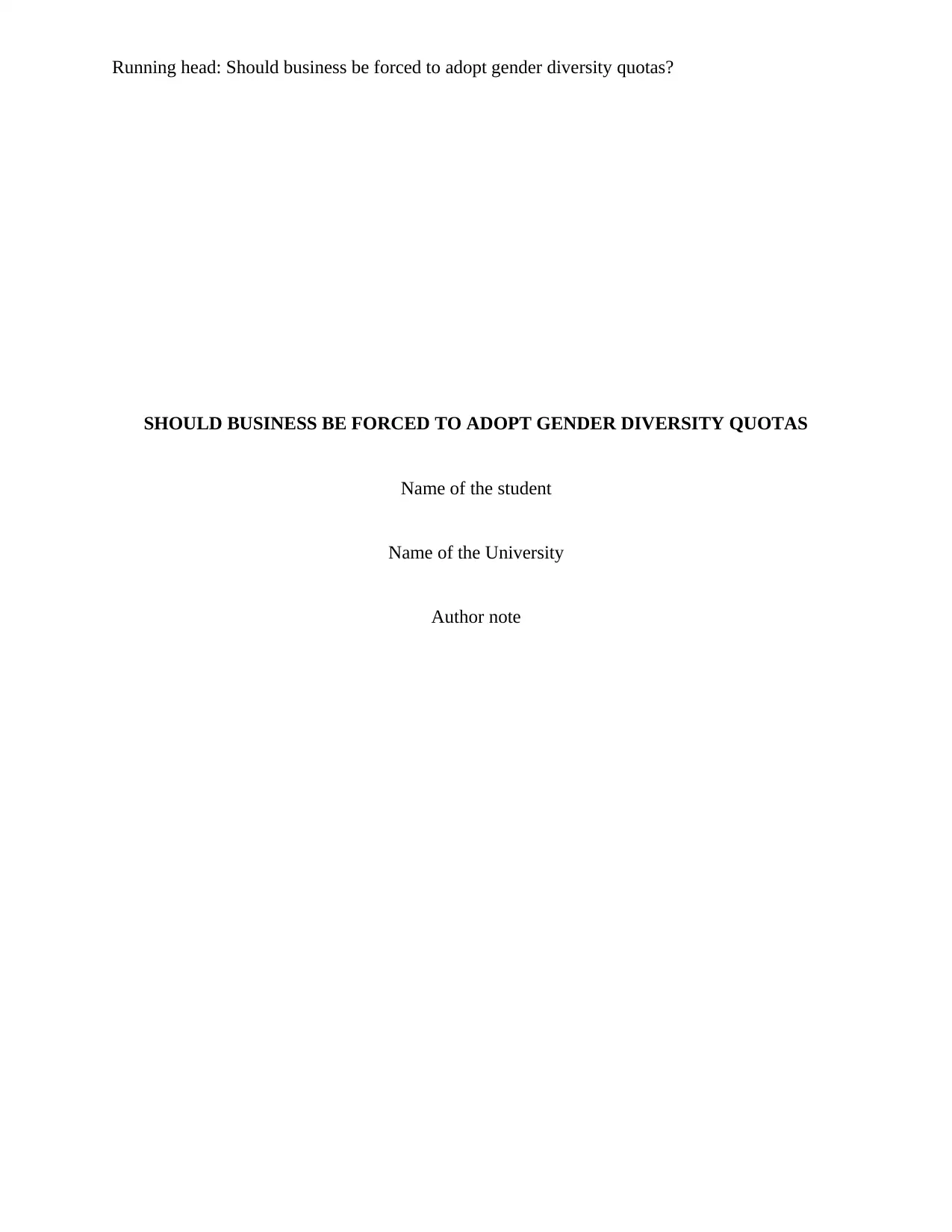
Running head: Should business be forced to adopt gender diversity quotas?
SHOULD BUSINESS BE FORCED TO ADOPT GENDER DIVERSITY QUOTAS
Name of the student
Name of the University
Author note
SHOULD BUSINESS BE FORCED TO ADOPT GENDER DIVERSITY QUOTAS
Name of the student
Name of the University
Author note
Paraphrase This Document
Need a fresh take? Get an instant paraphrase of this document with our AI Paraphraser
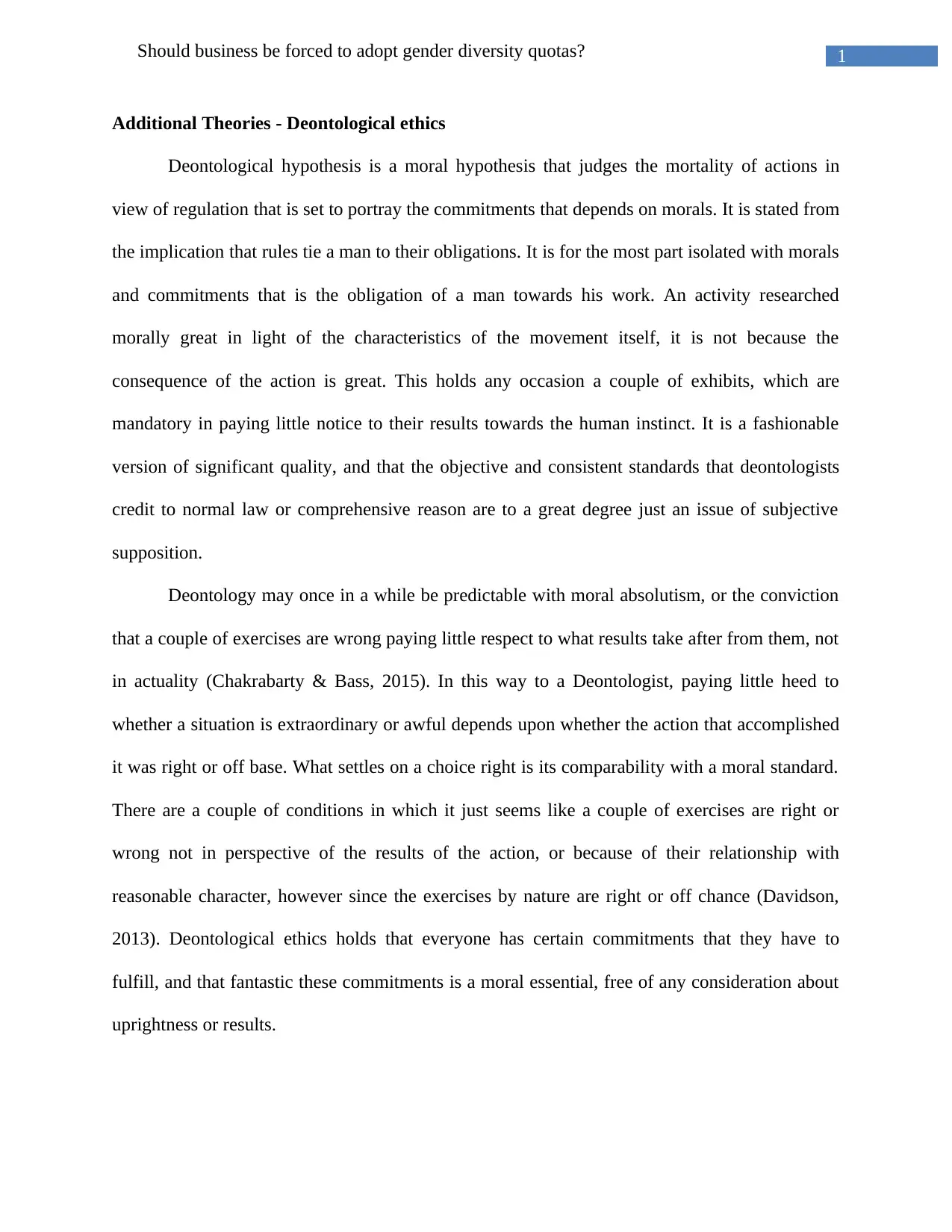
1Should business be forced to adopt gender diversity quotas?
Additional Theories - Deontological ethics
Deontological hypothesis is a moral hypothesis that judges the mortality of actions in
view of regulation that is set to portray the commitments that depends on morals. It is stated from
the implication that rules tie a man to their obligations. It is for the most part isolated with morals
and commitments that is the obligation of a man towards his work. An activity researched
morally great in light of the characteristics of the movement itself, it is not because the
consequence of the action is great. This holds any occasion a couple of exhibits, which are
mandatory in paying little notice to their results towards the human instinct. It is a fashionable
version of significant quality, and that the objective and consistent standards that deontologists
credit to normal law or comprehensive reason are to a great degree just an issue of subjective
supposition.
Deontology may once in a while be predictable with moral absolutism, or the conviction
that a couple of exercises are wrong paying little respect to what results take after from them, not
in actuality (Chakrabarty & Bass, 2015). In this way to a Deontologist, paying little heed to
whether a situation is extraordinary or awful depends upon whether the action that accomplished
it was right or off base. What settles on a choice right is its comparability with a moral standard.
There are a couple of conditions in which it just seems like a couple of exercises are right or
wrong not in perspective of the results of the action, or because of their relationship with
reasonable character, however since the exercises by nature are right or off chance (Davidson,
2013). Deontological ethics holds that everyone has certain commitments that they have to
fulfill, and that fantastic these commitments is a moral essential, free of any consideration about
uprightness or results.
Additional Theories - Deontological ethics
Deontological hypothesis is a moral hypothesis that judges the mortality of actions in
view of regulation that is set to portray the commitments that depends on morals. It is stated from
the implication that rules tie a man to their obligations. It is for the most part isolated with morals
and commitments that is the obligation of a man towards his work. An activity researched
morally great in light of the characteristics of the movement itself, it is not because the
consequence of the action is great. This holds any occasion a couple of exhibits, which are
mandatory in paying little notice to their results towards the human instinct. It is a fashionable
version of significant quality, and that the objective and consistent standards that deontologists
credit to normal law or comprehensive reason are to a great degree just an issue of subjective
supposition.
Deontology may once in a while be predictable with moral absolutism, or the conviction
that a couple of exercises are wrong paying little respect to what results take after from them, not
in actuality (Chakrabarty & Bass, 2015). In this way to a Deontologist, paying little heed to
whether a situation is extraordinary or awful depends upon whether the action that accomplished
it was right or off base. What settles on a choice right is its comparability with a moral standard.
There are a couple of conditions in which it just seems like a couple of exercises are right or
wrong not in perspective of the results of the action, or because of their relationship with
reasonable character, however since the exercises by nature are right or off chance (Davidson,
2013). Deontological ethics holds that everyone has certain commitments that they have to
fulfill, and that fantastic these commitments is a moral essential, free of any consideration about
uprightness or results.
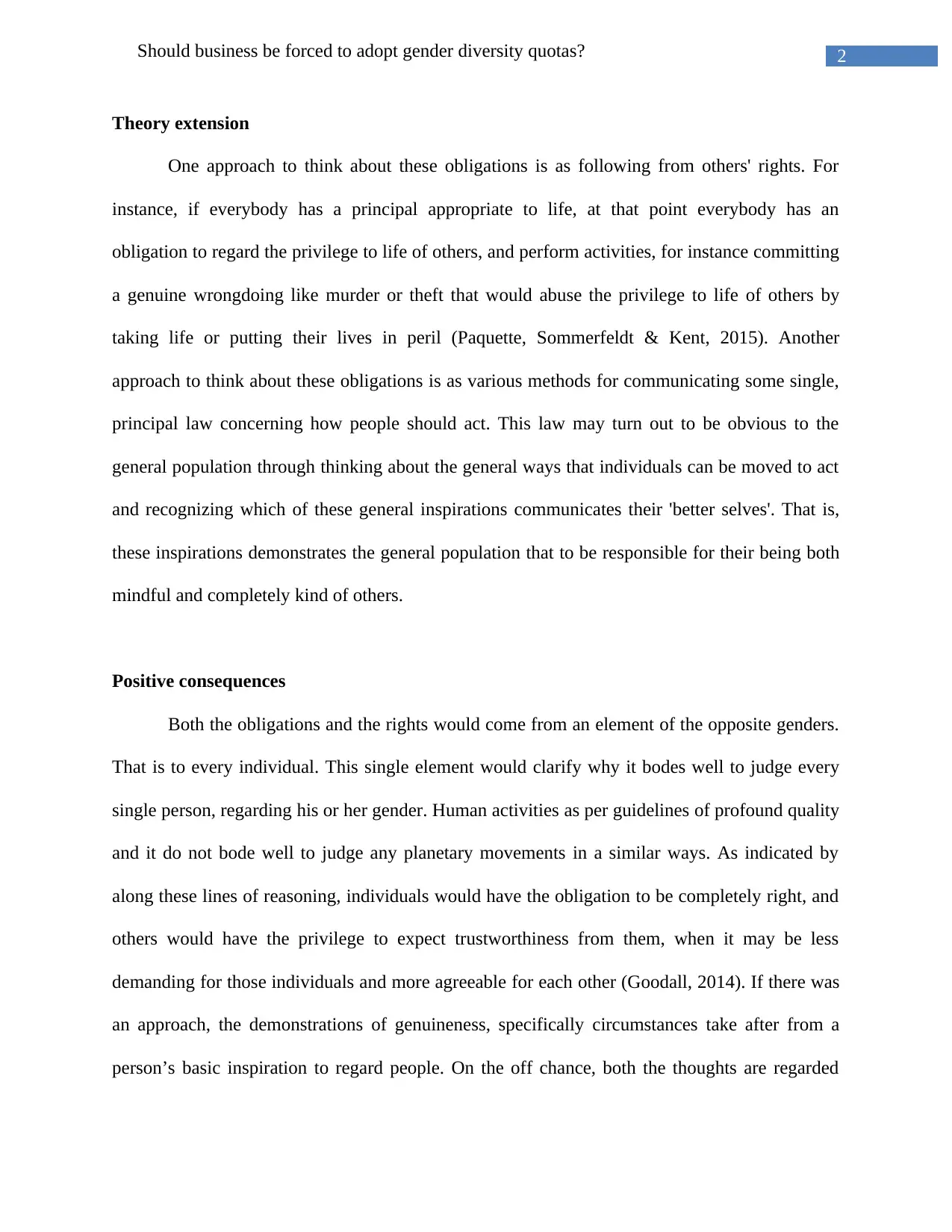
2Should business be forced to adopt gender diversity quotas?
Theory extension
One approach to think about these obligations is as following from others' rights. For
instance, if everybody has a principal appropriate to life, at that point everybody has an
obligation to regard the privilege to life of others, and perform activities, for instance committing
a genuine wrongdoing like murder or theft that would abuse the privilege to life of others by
taking life or putting their lives in peril (Paquette, Sommerfeldt & Kent, 2015). Another
approach to think about these obligations is as various methods for communicating some single,
principal law concerning how people should act. This law may turn out to be obvious to the
general population through thinking about the general ways that individuals can be moved to act
and recognizing which of these general inspirations communicates their 'better selves'. That is,
these inspirations demonstrates the general population that to be responsible for their being both
mindful and completely kind of others.
Positive consequences
Both the obligations and the rights would come from an element of the opposite genders.
That is to every individual. This single element would clarify why it bodes well to judge every
single person, regarding his or her gender. Human activities as per guidelines of profound quality
and it do not bode well to judge any planetary movements in a similar ways. As indicated by
along these lines of reasoning, individuals would have the obligation to be completely right, and
others would have the privilege to expect trustworthiness from them, when it may be less
demanding for those individuals and more agreeable for each other (Goodall, 2014). If there was
an approach, the demonstrations of genuineness, specifically circumstances take after from a
person’s basic inspiration to regard people. On the off chance, both the thoughts are regarded
Theory extension
One approach to think about these obligations is as following from others' rights. For
instance, if everybody has a principal appropriate to life, at that point everybody has an
obligation to regard the privilege to life of others, and perform activities, for instance committing
a genuine wrongdoing like murder or theft that would abuse the privilege to life of others by
taking life or putting their lives in peril (Paquette, Sommerfeldt & Kent, 2015). Another
approach to think about these obligations is as various methods for communicating some single,
principal law concerning how people should act. This law may turn out to be obvious to the
general population through thinking about the general ways that individuals can be moved to act
and recognizing which of these general inspirations communicates their 'better selves'. That is,
these inspirations demonstrates the general population that to be responsible for their being both
mindful and completely kind of others.
Positive consequences
Both the obligations and the rights would come from an element of the opposite genders.
That is to every individual. This single element would clarify why it bodes well to judge every
single person, regarding his or her gender. Human activities as per guidelines of profound quality
and it do not bode well to judge any planetary movements in a similar ways. As indicated by
along these lines of reasoning, individuals would have the obligation to be completely right, and
others would have the privilege to expect trustworthiness from them, when it may be less
demanding for those individuals and more agreeable for each other (Goodall, 2014). If there was
an approach, the demonstrations of genuineness, specifically circumstances take after from a
person’s basic inspiration to regard people. On the off chance, both the thoughts are regarded
⊘ This is a preview!⊘
Do you want full access?
Subscribe today to unlock all pages.

Trusted by 1+ million students worldwide
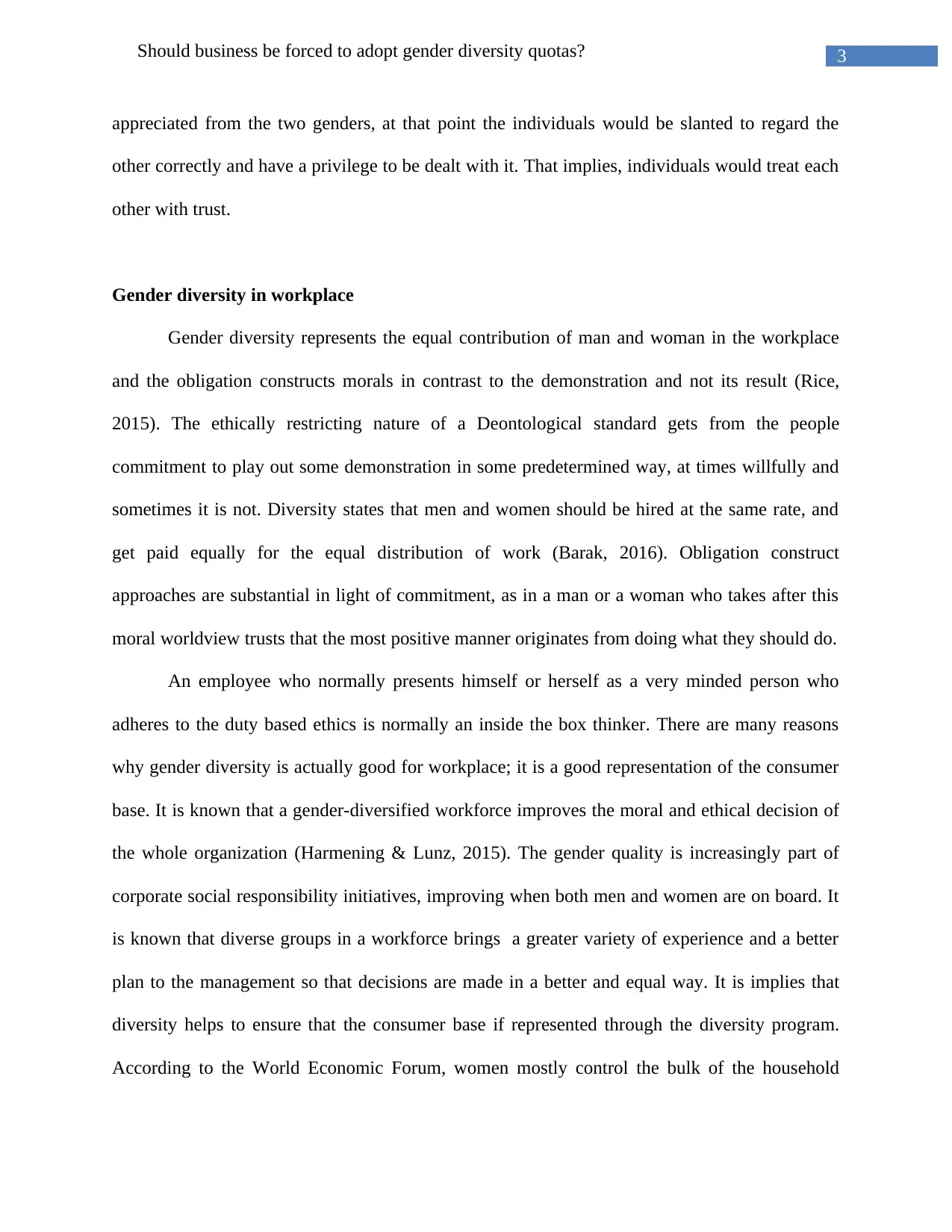
3Should business be forced to adopt gender diversity quotas?
appreciated from the two genders, at that point the individuals would be slanted to regard the
other correctly and have a privilege to be dealt with it. That implies, individuals would treat each
other with trust.
Gender diversity in workplace
Gender diversity represents the equal contribution of man and woman in the workplace
and the obligation constructs morals in contrast to the demonstration and not its result (Rice,
2015). The ethically restricting nature of a Deontological standard gets from the people
commitment to play out some demonstration in some predetermined way, at times willfully and
sometimes it is not. Diversity states that men and women should be hired at the same rate, and
get paid equally for the equal distribution of work (Barak, 2016). Obligation construct
approaches are substantial in light of commitment, as in a man or a woman who takes after this
moral worldview trusts that the most positive manner originates from doing what they should do.
An employee who normally presents himself or herself as a very minded person who
adheres to the duty based ethics is normally an inside the box thinker. There are many reasons
why gender diversity is actually good for workplace; it is a good representation of the consumer
base. It is known that a gender-diversified workforce improves the moral and ethical decision of
the whole organization (Harmening & Lunz, 2015). The gender quality is increasingly part of
corporate social responsibility initiatives, improving when both men and women are on board. It
is known that diverse groups in a workforce brings a greater variety of experience and a better
plan to the management so that decisions are made in a better and equal way. It is implies that
diversity helps to ensure that the consumer base if represented through the diversity program.
According to the World Economic Forum, women mostly control the bulk of the household
appreciated from the two genders, at that point the individuals would be slanted to regard the
other correctly and have a privilege to be dealt with it. That implies, individuals would treat each
other with trust.
Gender diversity in workplace
Gender diversity represents the equal contribution of man and woman in the workplace
and the obligation constructs morals in contrast to the demonstration and not its result (Rice,
2015). The ethically restricting nature of a Deontological standard gets from the people
commitment to play out some demonstration in some predetermined way, at times willfully and
sometimes it is not. Diversity states that men and women should be hired at the same rate, and
get paid equally for the equal distribution of work (Barak, 2016). Obligation construct
approaches are substantial in light of commitment, as in a man or a woman who takes after this
moral worldview trusts that the most positive manner originates from doing what they should do.
An employee who normally presents himself or herself as a very minded person who
adheres to the duty based ethics is normally an inside the box thinker. There are many reasons
why gender diversity is actually good for workplace; it is a good representation of the consumer
base. It is known that a gender-diversified workforce improves the moral and ethical decision of
the whole organization (Harmening & Lunz, 2015). The gender quality is increasingly part of
corporate social responsibility initiatives, improving when both men and women are on board. It
is known that diverse groups in a workforce brings a greater variety of experience and a better
plan to the management so that decisions are made in a better and equal way. It is implies that
diversity helps to ensure that the consumer base if represented through the diversity program.
According to the World Economic Forum, women mostly control the bulk of the household
Paraphrase This Document
Need a fresh take? Get an instant paraphrase of this document with our AI Paraphraser
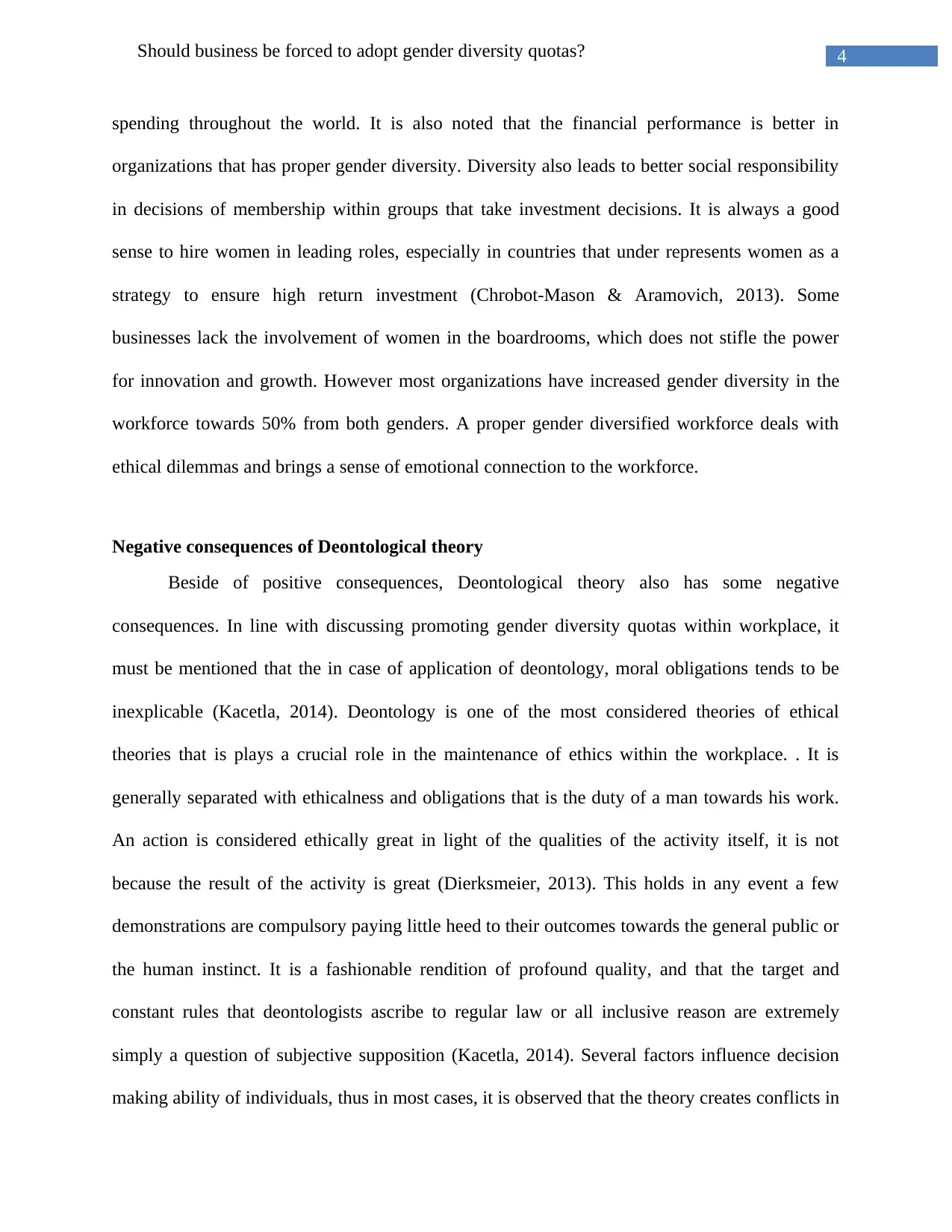
4Should business be forced to adopt gender diversity quotas?
spending throughout the world. It is also noted that the financial performance is better in
organizations that has proper gender diversity. Diversity also leads to better social responsibility
in decisions of membership within groups that take investment decisions. It is always a good
sense to hire women in leading roles, especially in countries that under represents women as a
strategy to ensure high return investment (Chrobot-Mason & Aramovich, 2013). Some
businesses lack the involvement of women in the boardrooms, which does not stifle the power
for innovation and growth. However most organizations have increased gender diversity in the
workforce towards 50% from both genders. A proper gender diversified workforce deals with
ethical dilemmas and brings a sense of emotional connection to the workforce.
Negative consequences of Deontological theory
Beside of positive consequences, Deontological theory also has some negative
consequences. In line with discussing promoting gender diversity quotas within workplace, it
must be mentioned that the in case of application of deontology, moral obligations tends to be
inexplicable (Kacetla, 2014). Deontology is one of the most considered theories of ethical
theories that is plays a crucial role in the maintenance of ethics within the workplace. . It is
generally separated with ethicalness and obligations that is the duty of a man towards his work.
An action is considered ethically great in light of the qualities of the activity itself, it is not
because the result of the activity is great (Dierksmeier, 2013). This holds in any event a few
demonstrations are compulsory paying little heed to their outcomes towards the general public or
the human instinct. It is a fashionable rendition of profound quality, and that the target and
constant rules that deontologists ascribe to regular law or all inclusive reason are extremely
simply a question of subjective supposition (Kacetla, 2014). Several factors influence decision
making ability of individuals, thus in most cases, it is observed that the theory creates conflicts in
spending throughout the world. It is also noted that the financial performance is better in
organizations that has proper gender diversity. Diversity also leads to better social responsibility
in decisions of membership within groups that take investment decisions. It is always a good
sense to hire women in leading roles, especially in countries that under represents women as a
strategy to ensure high return investment (Chrobot-Mason & Aramovich, 2013). Some
businesses lack the involvement of women in the boardrooms, which does not stifle the power
for innovation and growth. However most organizations have increased gender diversity in the
workforce towards 50% from both genders. A proper gender diversified workforce deals with
ethical dilemmas and brings a sense of emotional connection to the workforce.
Negative consequences of Deontological theory
Beside of positive consequences, Deontological theory also has some negative
consequences. In line with discussing promoting gender diversity quotas within workplace, it
must be mentioned that the in case of application of deontology, moral obligations tends to be
inexplicable (Kacetla, 2014). Deontology is one of the most considered theories of ethical
theories that is plays a crucial role in the maintenance of ethics within the workplace. . It is
generally separated with ethicalness and obligations that is the duty of a man towards his work.
An action is considered ethically great in light of the qualities of the activity itself, it is not
because the result of the activity is great (Dierksmeier, 2013). This holds in any event a few
demonstrations are compulsory paying little heed to their outcomes towards the general public or
the human instinct. It is a fashionable rendition of profound quality, and that the target and
constant rules that deontologists ascribe to regular law or all inclusive reason are extremely
simply a question of subjective supposition (Kacetla, 2014). Several factors influence decision
making ability of individuals, thus in most cases, it is observed that the theory creates conflicts in
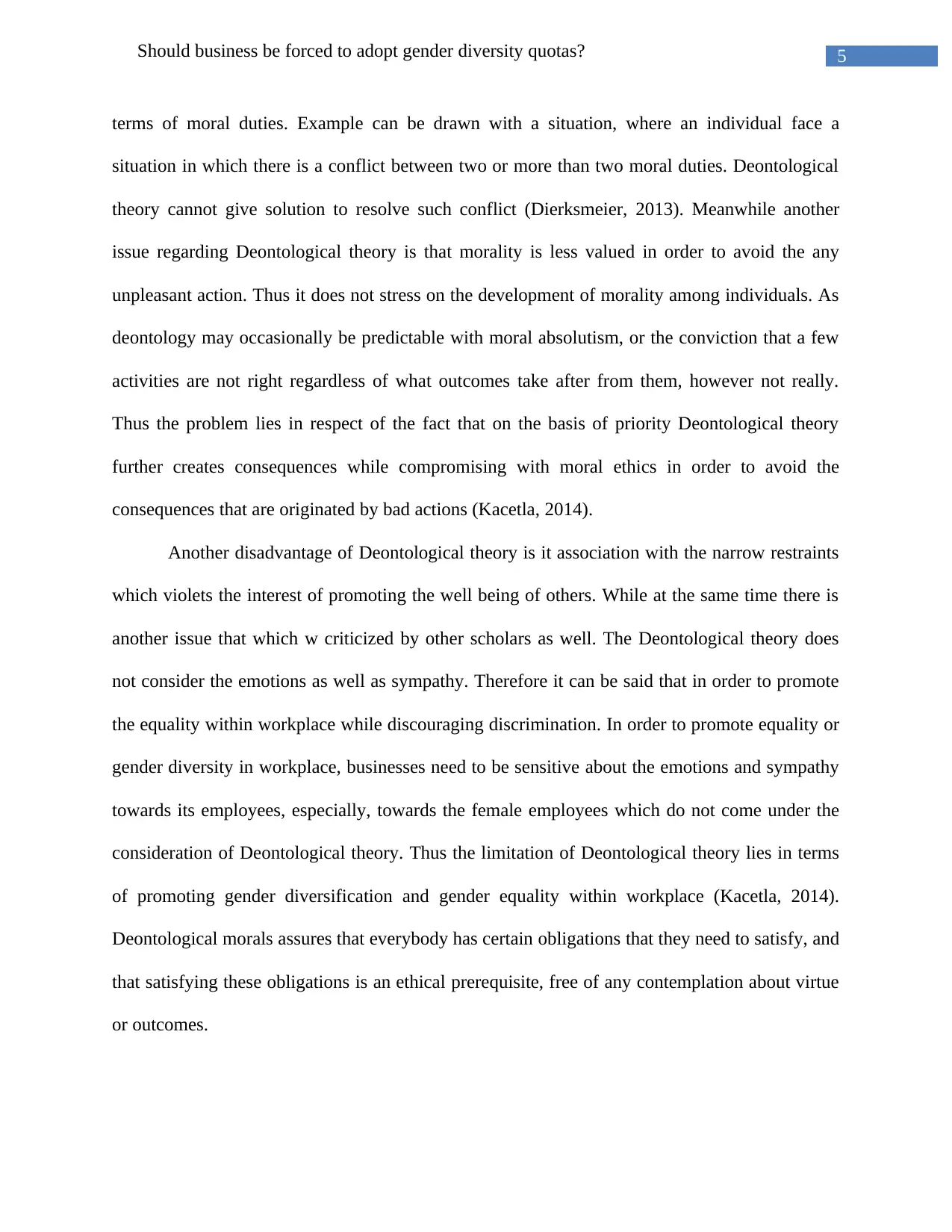
5Should business be forced to adopt gender diversity quotas?
terms of moral duties. Example can be drawn with a situation, where an individual face a
situation in which there is a conflict between two or more than two moral duties. Deontological
theory cannot give solution to resolve such conflict (Dierksmeier, 2013). Meanwhile another
issue regarding Deontological theory is that morality is less valued in order to avoid the any
unpleasant action. Thus it does not stress on the development of morality among individuals. As
deontology may occasionally be predictable with moral absolutism, or the conviction that a few
activities are not right regardless of what outcomes take after from them, however not really.
Thus the problem lies in respect of the fact that on the basis of priority Deontological theory
further creates consequences while compromising with moral ethics in order to avoid the
consequences that are originated by bad actions (Kacetla, 2014).
Another disadvantage of Deontological theory is it association with the narrow restraints
which violets the interest of promoting the well being of others. While at the same time there is
another issue that which w criticized by other scholars as well. The Deontological theory does
not consider the emotions as well as sympathy. Therefore it can be said that in order to promote
the equality within workplace while discouraging discrimination. In order to promote equality or
gender diversity in workplace, businesses need to be sensitive about the emotions and sympathy
towards its employees, especially, towards the female employees which do not come under the
consideration of Deontological theory. Thus the limitation of Deontological theory lies in terms
of promoting gender diversification and gender equality within workplace (Kacetla, 2014).
Deontological morals assures that everybody has certain obligations that they need to satisfy, and
that satisfying these obligations is an ethical prerequisite, free of any contemplation about virtue
or outcomes.
terms of moral duties. Example can be drawn with a situation, where an individual face a
situation in which there is a conflict between two or more than two moral duties. Deontological
theory cannot give solution to resolve such conflict (Dierksmeier, 2013). Meanwhile another
issue regarding Deontological theory is that morality is less valued in order to avoid the any
unpleasant action. Thus it does not stress on the development of morality among individuals. As
deontology may occasionally be predictable with moral absolutism, or the conviction that a few
activities are not right regardless of what outcomes take after from them, however not really.
Thus the problem lies in respect of the fact that on the basis of priority Deontological theory
further creates consequences while compromising with moral ethics in order to avoid the
consequences that are originated by bad actions (Kacetla, 2014).
Another disadvantage of Deontological theory is it association with the narrow restraints
which violets the interest of promoting the well being of others. While at the same time there is
another issue that which w criticized by other scholars as well. The Deontological theory does
not consider the emotions as well as sympathy. Therefore it can be said that in order to promote
the equality within workplace while discouraging discrimination. In order to promote equality or
gender diversity in workplace, businesses need to be sensitive about the emotions and sympathy
towards its employees, especially, towards the female employees which do not come under the
consideration of Deontological theory. Thus the limitation of Deontological theory lies in terms
of promoting gender diversification and gender equality within workplace (Kacetla, 2014).
Deontological morals assures that everybody has certain obligations that they need to satisfy, and
that satisfying these obligations is an ethical prerequisite, free of any contemplation about virtue
or outcomes.
⊘ This is a preview!⊘
Do you want full access?
Subscribe today to unlock all pages.

Trusted by 1+ million students worldwide
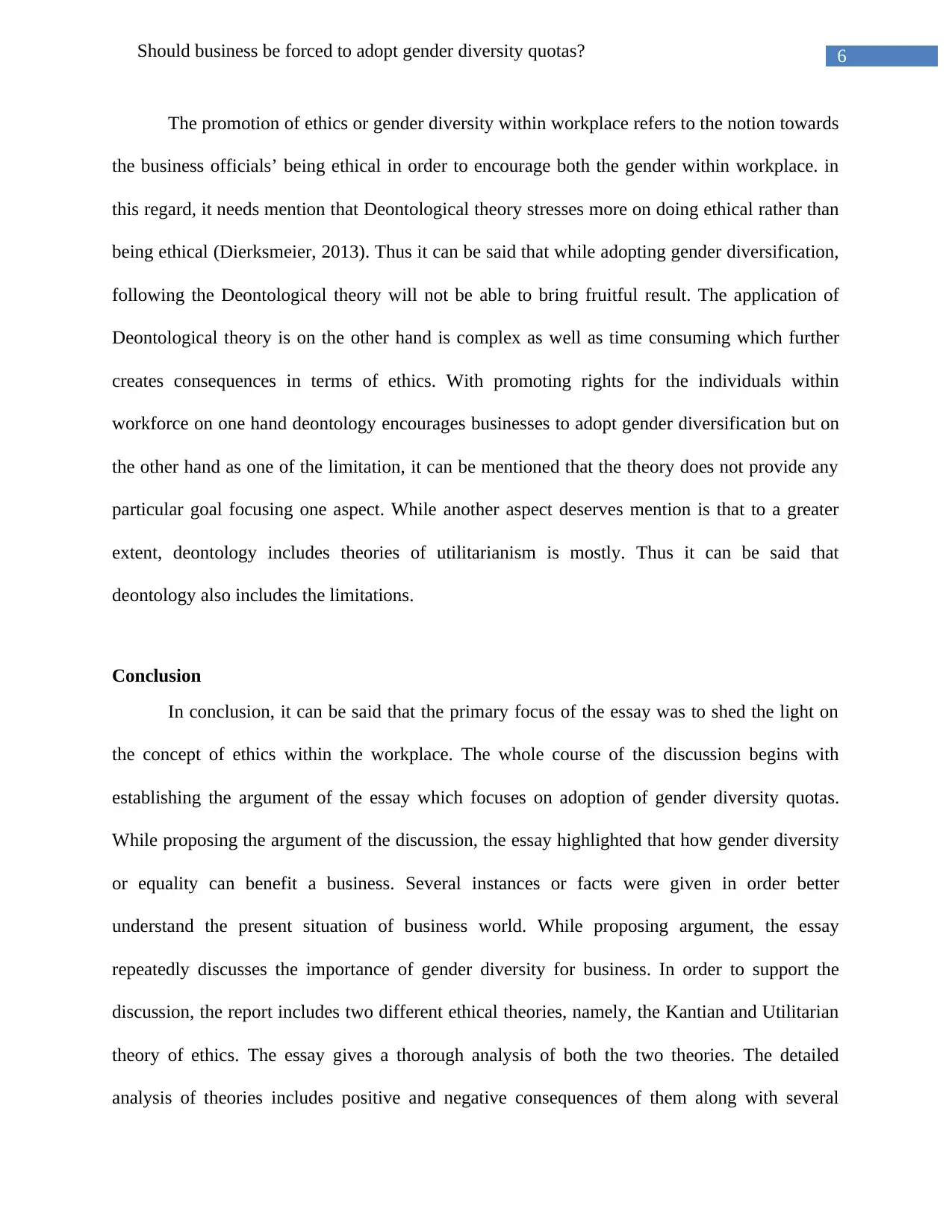
6Should business be forced to adopt gender diversity quotas?
The promotion of ethics or gender diversity within workplace refers to the notion towards
the business officials’ being ethical in order to encourage both the gender within workplace. in
this regard, it needs mention that Deontological theory stresses more on doing ethical rather than
being ethical (Dierksmeier, 2013). Thus it can be said that while adopting gender diversification,
following the Deontological theory will not be able to bring fruitful result. The application of
Deontological theory is on the other hand is complex as well as time consuming which further
creates consequences in terms of ethics. With promoting rights for the individuals within
workforce on one hand deontology encourages businesses to adopt gender diversification but on
the other hand as one of the limitation, it can be mentioned that the theory does not provide any
particular goal focusing one aspect. While another aspect deserves mention is that to a greater
extent, deontology includes theories of utilitarianism is mostly. Thus it can be said that
deontology also includes the limitations.
Conclusion
In conclusion, it can be said that the primary focus of the essay was to shed the light on
the concept of ethics within the workplace. The whole course of the discussion begins with
establishing the argument of the essay which focuses on adoption of gender diversity quotas.
While proposing the argument of the discussion, the essay highlighted that how gender diversity
or equality can benefit a business. Several instances or facts were given in order better
understand the present situation of business world. While proposing argument, the essay
repeatedly discusses the importance of gender diversity for business. In order to support the
discussion, the report includes two different ethical theories, namely, the Kantian and Utilitarian
theory of ethics. The essay gives a thorough analysis of both the two theories. The detailed
analysis of theories includes positive and negative consequences of them along with several
The promotion of ethics or gender diversity within workplace refers to the notion towards
the business officials’ being ethical in order to encourage both the gender within workplace. in
this regard, it needs mention that Deontological theory stresses more on doing ethical rather than
being ethical (Dierksmeier, 2013). Thus it can be said that while adopting gender diversification,
following the Deontological theory will not be able to bring fruitful result. The application of
Deontological theory is on the other hand is complex as well as time consuming which further
creates consequences in terms of ethics. With promoting rights for the individuals within
workforce on one hand deontology encourages businesses to adopt gender diversification but on
the other hand as one of the limitation, it can be mentioned that the theory does not provide any
particular goal focusing one aspect. While another aspect deserves mention is that to a greater
extent, deontology includes theories of utilitarianism is mostly. Thus it can be said that
deontology also includes the limitations.
Conclusion
In conclusion, it can be said that the primary focus of the essay was to shed the light on
the concept of ethics within the workplace. The whole course of the discussion begins with
establishing the argument of the essay which focuses on adoption of gender diversity quotas.
While proposing the argument of the discussion, the essay highlighted that how gender diversity
or equality can benefit a business. Several instances or facts were given in order better
understand the present situation of business world. While proposing argument, the essay
repeatedly discusses the importance of gender diversity for business. In order to support the
discussion, the report includes two different ethical theories, namely, the Kantian and Utilitarian
theory of ethics. The essay gives a thorough analysis of both the two theories. The detailed
analysis of theories includes positive and negative consequences of them along with several
Paraphrase This Document
Need a fresh take? Get an instant paraphrase of this document with our AI Paraphraser
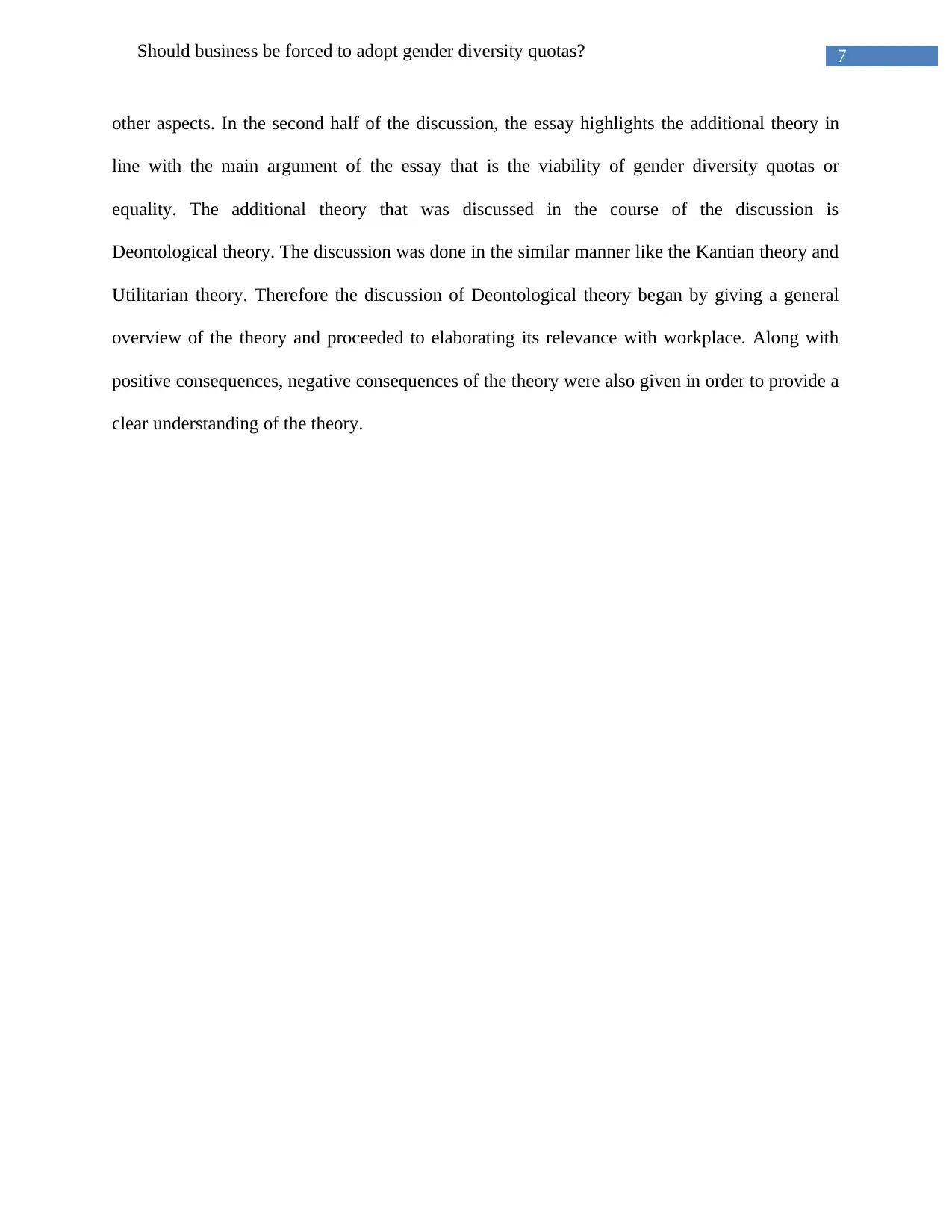
7Should business be forced to adopt gender diversity quotas?
other aspects. In the second half of the discussion, the essay highlights the additional theory in
line with the main argument of the essay that is the viability of gender diversity quotas or
equality. The additional theory that was discussed in the course of the discussion is
Deontological theory. The discussion was done in the similar manner like the Kantian theory and
Utilitarian theory. Therefore the discussion of Deontological theory began by giving a general
overview of the theory and proceeded to elaborating its relevance with workplace. Along with
positive consequences, negative consequences of the theory were also given in order to provide a
clear understanding of the theory.
other aspects. In the second half of the discussion, the essay highlights the additional theory in
line with the main argument of the essay that is the viability of gender diversity quotas or
equality. The additional theory that was discussed in the course of the discussion is
Deontological theory. The discussion was done in the similar manner like the Kantian theory and
Utilitarian theory. Therefore the discussion of Deontological theory began by giving a general
overview of the theory and proceeded to elaborating its relevance with workplace. Along with
positive consequences, negative consequences of the theory were also given in order to provide a
clear understanding of the theory.
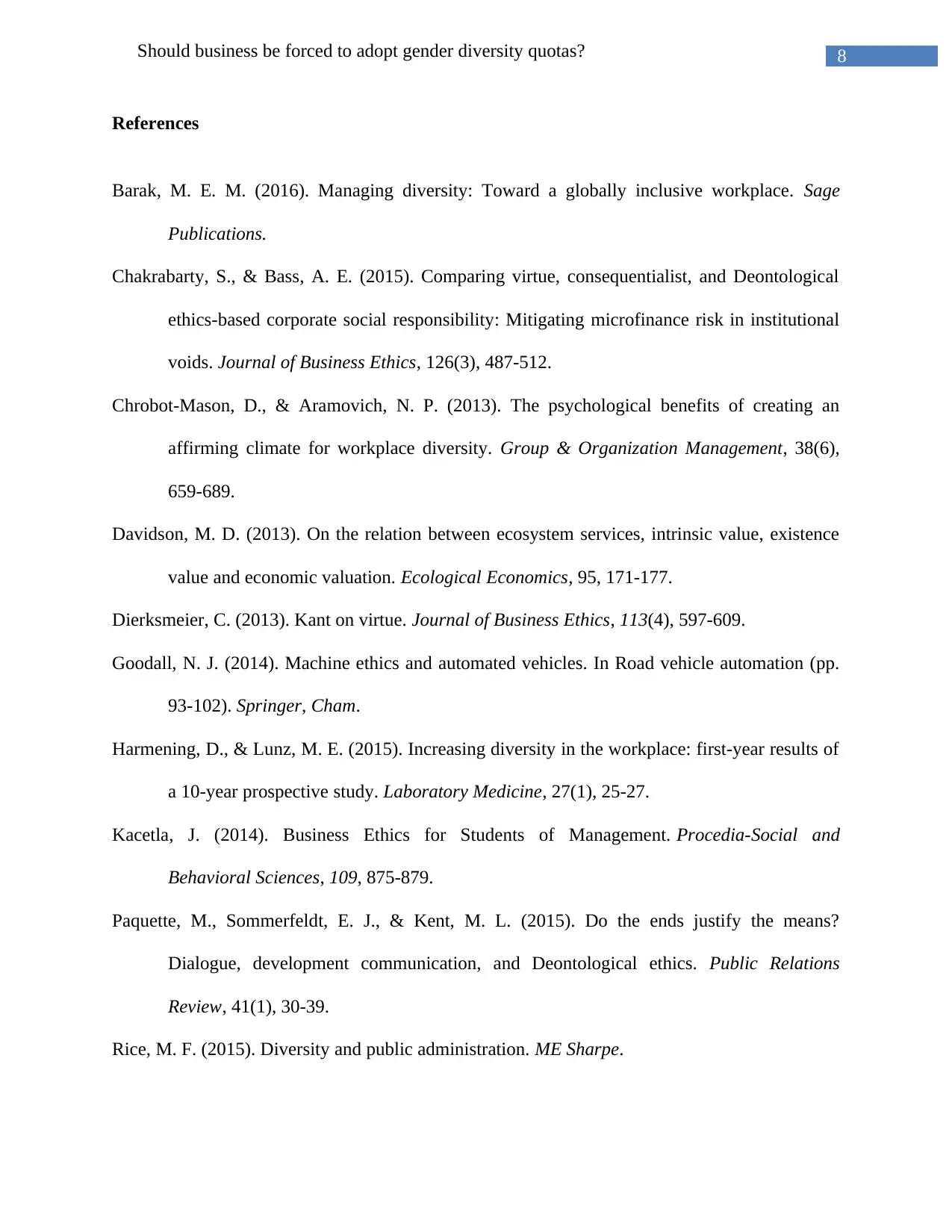
8Should business be forced to adopt gender diversity quotas?
References
Barak, M. E. M. (2016). Managing diversity: Toward a globally inclusive workplace. Sage
Publications.
Chakrabarty, S., & Bass, A. E. (2015). Comparing virtue, consequentialist, and Deontological
ethics-based corporate social responsibility: Mitigating microfinance risk in institutional
voids. Journal of Business Ethics, 126(3), 487-512.
Chrobot-Mason, D., & Aramovich, N. P. (2013). The psychological benefits of creating an
affirming climate for workplace diversity. Group & Organization Management, 38(6),
659-689.
Davidson, M. D. (2013). On the relation between ecosystem services, intrinsic value, existence
value and economic valuation. Ecological Economics, 95, 171-177.
Dierksmeier, C. (2013). Kant on virtue. Journal of Business Ethics, 113(4), 597-609.
Goodall, N. J. (2014). Machine ethics and automated vehicles. In Road vehicle automation (pp.
93-102). Springer, Cham.
Harmening, D., & Lunz, M. E. (2015). Increasing diversity in the workplace: first-year results of
a 10-year prospective study. Laboratory Medicine, 27(1), 25-27.
Kacetla, J. (2014). Business Ethics for Students of Management. Procedia-Social and
Behavioral Sciences, 109, 875-879.
Paquette, M., Sommerfeldt, E. J., & Kent, M. L. (2015). Do the ends justify the means?
Dialogue, development communication, and Deontological ethics. Public Relations
Review, 41(1), 30-39.
Rice, M. F. (2015). Diversity and public administration. ME Sharpe.
References
Barak, M. E. M. (2016). Managing diversity: Toward a globally inclusive workplace. Sage
Publications.
Chakrabarty, S., & Bass, A. E. (2015). Comparing virtue, consequentialist, and Deontological
ethics-based corporate social responsibility: Mitigating microfinance risk in institutional
voids. Journal of Business Ethics, 126(3), 487-512.
Chrobot-Mason, D., & Aramovich, N. P. (2013). The psychological benefits of creating an
affirming climate for workplace diversity. Group & Organization Management, 38(6),
659-689.
Davidson, M. D. (2013). On the relation between ecosystem services, intrinsic value, existence
value and economic valuation. Ecological Economics, 95, 171-177.
Dierksmeier, C. (2013). Kant on virtue. Journal of Business Ethics, 113(4), 597-609.
Goodall, N. J. (2014). Machine ethics and automated vehicles. In Road vehicle automation (pp.
93-102). Springer, Cham.
Harmening, D., & Lunz, M. E. (2015). Increasing diversity in the workplace: first-year results of
a 10-year prospective study. Laboratory Medicine, 27(1), 25-27.
Kacetla, J. (2014). Business Ethics for Students of Management. Procedia-Social and
Behavioral Sciences, 109, 875-879.
Paquette, M., Sommerfeldt, E. J., & Kent, M. L. (2015). Do the ends justify the means?
Dialogue, development communication, and Deontological ethics. Public Relations
Review, 41(1), 30-39.
Rice, M. F. (2015). Diversity and public administration. ME Sharpe.
⊘ This is a preview!⊘
Do you want full access?
Subscribe today to unlock all pages.

Trusted by 1+ million students worldwide
1 out of 9
Your All-in-One AI-Powered Toolkit for Academic Success.
+13062052269
info@desklib.com
Available 24*7 on WhatsApp / Email
![[object Object]](/_next/static/media/star-bottom.7253800d.svg)
Unlock your academic potential
Copyright © 2020–2025 A2Z Services. All Rights Reserved. Developed and managed by ZUCOL.